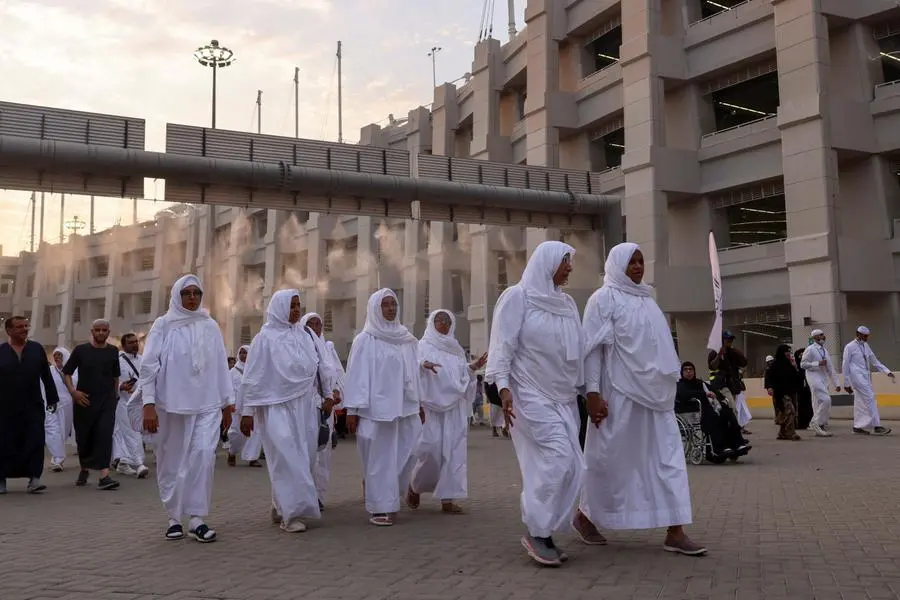PHOTO
MINA — The Ministry of Interior held its daily press conference for the 1445 AH/2024 AD Hajj season, announcing the successful completion of the transportation of pilgrims within the holy sites as they returned to Mina this morning.
Colonel Talal Al-Shalhoub, security spokesman for the Ministry of Interior, noted that the pilgrims performed the Tawaf Al-Ifadah and the stoning of Jamrat Al-Aqaba safely and peacefully. He emphasized the continued commitment of the security forces to maintain the security and safety of the pilgrims during their stay in Mina, their performance of rituals at the Grand Mosque, and at the Jamarat Bridge.
Al-Shalhoub urged pilgrims to continue adhering to the instructions that regulate their movements during the Days of Tashreeq, and follow the organized flow and designated directions on the roads leading to the Jamarat Bridge and the Grand Mosque during departure and return. He also advised pilgrims to refrain from carrying luggage to the Jamarat Bridge and the Grand Mosque and to maintain calmness and order during their movement. Additionally, he reminded those hurrying to depart from Mina on the second Day of Tashreeq not to leave their camps before the specified times determined by officials.
Al-Shalhoub commended the efforts made by the security sectors, noting that the Unified Security Operations Center (911) in the Makkah region received a total of 78,872 calls on the tenth day of Dhul-Hijjah. These calls included security reports, service inquiries, and general questions, all of which were fully addressed.
Regarding pilgrims' movement, Ayed Al-Ghuwaynem, Undersecretary of the Ministry of Hajj and Umrah for Hajj Affairs, reported that around 800,000 pilgrims arrived in Mina before dawn on Sunday, with the influx continuing until 8:30 AM. Approximately 850,000 pilgrims have performed the Tawaf Al-Ifadah so far since midnight, using buses to and from the Grand Mosque through 11 stations in Mina. The transportation efforts will continue for 35 hours to transport around 1,350,000 pilgrims.
Al-Ghuwaynem also highlighted that operations related to sacrificial offerings (Hady and Adahi) have been organized according to the highest environmental standards, utilizing a modern and advanced system for managing animal waste. This is part of the Kingdom of Saudi Arabia Project for Utilization of Hady and Adahi, with a capacity exceeding 1 million sacrificial offerings.
Saleh Al-Zuwaid, Spokesman of the Transport and Logistic Services System during the Hajj season, clarified that the operational plans for the Mashaer train are progressing as planned. The train has been operating for the fourth day, providing convenient transportation services for the pilgrims. During the past 24 hours as well as the Nafrah phase from sunset on Saturday until 12:30 AM on Sunday, more than 305,000 pilgrims were transported from Arafat to Muzdalifah, and over 360,000 pilgrims were transported from Muzdalifah to Mina.
At 9:00 AM on the first day of Eid Al-Adha, the fifth movement of the Mashaer train started, connecting stations such as Arafat 3, Muzdalifah 3, Mina 1, Mina 2, and reaching the Jamarat Bridge in Mina. Over 100,000 passengers have benefited from this phase so far, and these movements will continue until sunset on the 13th of Dhul-Hijjah.
The Haramain High Speed Railway continues its operations as planned, with over 3,800 trips throughout the entire Hajj season. The plan has provided over 1.6 million seats, and it is expected to reach its peak operational capacity on the 13th of Dhul-Hijjah, with 126 trips in a single day.
In the aviation sector, the second phase of the operational plan for this year's Hajj will begin to facilitate the departure of the pilgrims through 6 designated domestic and international airports, highlighting the success of the first phase of the plan. Plans for the expansion of the "Hajj without Bag" initiative, which served around 700,000 pilgrims in the previous year, were also emphasized.
Mohammed Al-Abdulaali, Spokesman for the Saudi Health Ministry, described the health and epidemiological situation during the current Hajj season as reassuring. He noted that no significant diseases affecting public health have been recorded among pilgrims. However, he reported 2,764 cases of heat stress and sunstroke due to high temperatures and exposure to the sun during peak intensity hours from 11 AM to 4 PM. Al-Abdulaali stressed that failure to use umbrellas or drink water regularly contributed to these cases and assured that the Ministry of Health is closely monitoring the affected cases and wishes them a speedy recovery.
© Copyright 2022 The Saudi Gazette. All Rights Reserved. Provided by SyndiGate Media Inc. (Syndigate.info).





















